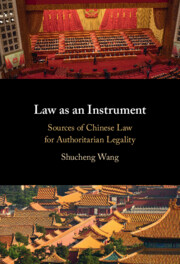Book contents
- Law as an Instrument
- Law as an Instrument
- Copyright page
- Dedication
- Epigraph
- Contents
- Figures
- Tables
- Preface and Acknowledgements
- Abbreviations
- 1 Introduction
- 2 A Dual Constitution with Illiberal Characteristics
- 3 Judicial Interpretation as a de facto Primary Statute for Adjudication
- 4 The Judicial Document as Informal State Law
- 5 Guiding Cases as a Form of Statutory Interpretation
- 6 Bureaucratization of Judicial Precedents
- 7 Concluding Reflections
- Appendix: Methodology and Data
- Bibliography
- Index
7 - Concluding Reflections
Chinese Law, Authoritarian Legality and Legal Instrumentalism
Published online by Cambridge University Press: 07 July 2022
- Law as an Instrument
- Law as an Instrument
- Copyright page
- Dedication
- Epigraph
- Contents
- Figures
- Tables
- Preface and Acknowledgements
- Abbreviations
- 1 Introduction
- 2 A Dual Constitution with Illiberal Characteristics
- 3 Judicial Interpretation as a de facto Primary Statute for Adjudication
- 4 The Judicial Document as Informal State Law
- 5 Guiding Cases as a Form of Statutory Interpretation
- 6 Bureaucratization of Judicial Precedents
- 7 Concluding Reflections
- Appendix: Methodology and Data
- Bibliography
- Index
Summary
This chapter proposes a theory of legal instrumentalism – contextually, a more explanatory framework than either Marxist or Confucian legal theories – to explain the function and role of law in Chinese society. This kind of instrumentalism, which differs from the debate over this theory in the Anglo-American tradition, is situated in China’s authoritarian regime, where a primary concern is the maintenance of political stability through strengthening authoritarian legality for the ruler. On this premise, economic development, as well as other social goals – such as efficiency of the government – for which the law can undoubtedly be placed in an instrumental position may become a priority in the ruler’s political agenda. When it comes to dispute resolution, the primary matter of concern is not the achievement of the formalist justice of Western tradition via either a formal or informal process but rather the settlement of disputes for which the law primarily plays a facilitative role as a tool, regardless of what strategies it may use. Instrumentalism of this kind, which is suitable for Chinese society both culturally and historically, shows that law is visible and does matter in China, although it cannot be completely understood through the lens of other legal traditions.
Keywords
- Type
- Chapter
- Information
- Law as an InstrumentSources of Chinese Law for Authoritarian Legality, pp. 162 - 180Publisher: Cambridge University PressPrint publication year: 2022



